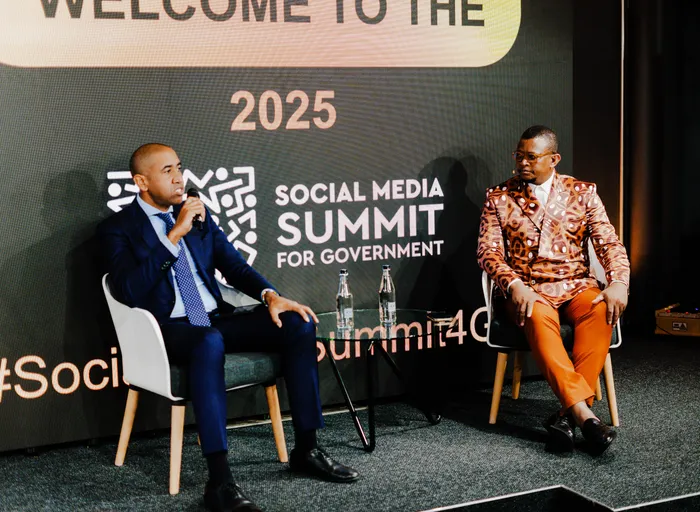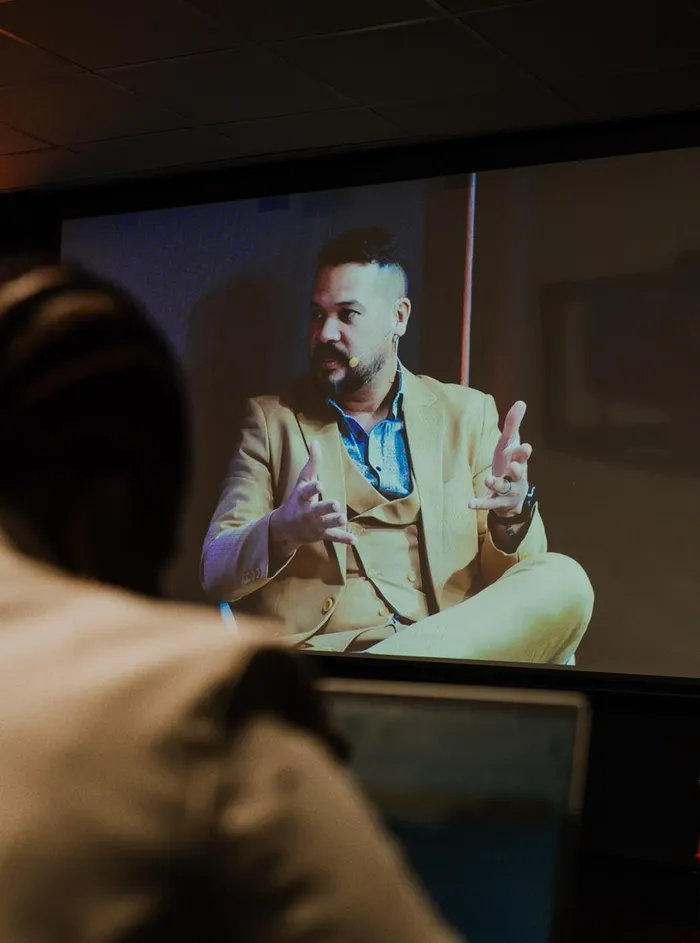Calls for government to create its own tech platforms

GovChat founder Professor Eldrid Jordaan speaking at the Social Media Summit for Government at the University of Johannesburg, in conversation with DeCode Communications CEO Lorato Tshenkeng.
Image: Supplied
GovChat founder Professor Eldrid Jordaan has implored the South African government to start, own and run its own technology platforms for the benefit of all South Africans.
Jordaan has slammed big tech, particularly Meta - which owns the likes of Facebook, WhatsApp and Instagram, saying they posed a threat to the digital sovereignty of countries like South Africa.
Jordaan, who was a key figure during the Mxit days and who later founded GovChat, which aims to enhance governance transparency and accountability through the provision of tools for citizens to measure service levels, was the keynote speaker at the Social Media Summit for Government, which is being hosted by the University of Johannesburg.
His speech was on the topic of Technology, Trust, and Transformation: Bridging the Digital Divide in Citizen Engagement. He said big tech, particularly Meta, wanted to be the player and the referee.
This comes after a long standing dispute between GovChat and Meta, which stems from 2020, where the civic organisation was accused of violating the terms of service of the WhatsApp Business API, despite the fact that GovChat had signed agreements with the SA government, allowing it to communicate on the governments behalf.
“The government needs to beware of public private partnerships that profit from public infrastructure,” Jordaan warned.
“Public goods should serve our people, not the private sector. GovChat was built to serve South Africans, it was not built to serve algorithms and shareholders.
“We can no longer afford to be digital tenants. We must use these tools, but not lose the power. We need to partner with big tech, do not depend on them,” said Jordaan.
Jordaan said South Africa had 1.5 million public servants who needed to be upskilled to navigate a changing world driven by artificial intelligence.
“We don't need to go to the private sector, we are seeing too many people hand over their responsibilities to the private sector, the private sector should strengthen government, it should not replace the work that is done by the government, there should be a big difference between mandate, scope of work,” he said.
Jordaan said it was important that big tech treats Africa with the same respect that it treated countries in the West, including how it harvested data of people on the continent.
He said recently, authorities in Nigeria had issued a $200 million fine for the use of people’s data without consent.
“We are not saying that the private sector should not profit because that's their model, just like how you have a business model in the government. The private sector is important, we need the private sector, but we must guard against the dependency.
“When you are dependent on something they hold the stick, they hold the power - I'm nervous about that, we need to be careful around what the intentions are,” said Jordaan.
Sassa own platform
Jordaan said a state institution like Sassa, should have its own platform to administer the millions of social welfare payments it administers monthly.
“The private sector is lucky there is so much inefficiency in government,” he remarked.
“Look at Sassa, if the South African government wanted to own a platform, I would start there. You have more than half population on Sassa, but you choose to use platforms that exist. If I were the government, I would use my own platform and make it mandatory.
“I say it again, the private sector is lucky there are inefficiencies in the government,” said Jordaan.

IOL editor Lance Witten speaking at the Social Media Summit for Government.
Image: Supplied
Earlier, IOL’s editor-in-chief Lance Witten urged government communicators to listen to the people in developing narratives and content around their government departments.
Witten made the comments during a fireside chat with SABC journalist Bongiwe Zwane at the summit.
“There is a steady decline in audiences engaging with platforms like news websites, which are now seen as legacy media. You can build the best content, but if you are not where your audience is, there is no point in creating that content,” he said.
Witten said tailored and platform specific content and messaging was key for audiences.
“What we have discovered is that we need to be where the audiences are… you need to create specific native for the platform you are on, if it is all tailored for the platform, that is where and how the audience will engage with it,” he said.
With shrinking revenues, Witten said it was important for communications teams to be clear about their identity, their narrative and to be unequivocal about a political stance.
He also said the impact of the changing consumption habits and technology such as AI, had a big impact on news publishers, and content teams needed to be aware of AI optimization, as the AI and search engines like Google became more of answer engines rather than search engines.
“Am I creating the content on my platform? Is it good for the crawler? Is it good for ChatGpt?
Are you creating content helping the answer engine? How am I answering the audience needs?
“From a news content provider perspective, it has impacted our concept of how we create content and the credibility, our audiences are on social media, they are good at spotting authenticity, they are less likely to trust a brand,” said Witten.
IOL